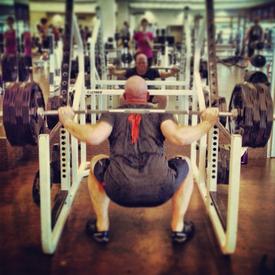The deload week

Capt_Apollo
Posts: 9,026 Member
how many of us live by the saying "give it your all?" i bet many of us do. but in fact a week were you concentrate on allowing your muscles to relax and repair themselves. it may be the next thing you do to help you break through a pleateu, or reach a new PR.
while the article that is linked below, and partially quoted, is related to weight lifting, it can apply to cardio and endurance athletes as well.
http://www.liftbigeatbig.com/2012/05/deload-week.html
while the article that is linked below, and partially quoted, is related to weight lifting, it can apply to cardio and endurance athletes as well.
http://www.liftbigeatbig.com/2012/05/deload-week.html
Most LBEB readers lift weights for two reasons: to get BIG & SKRONG. This happens with hurling heavy weights around the room, putting heavy weights on your back, and pushing *kitten* overhead. Combine this with eating large servings of mastodon flesh and you have the makings of an Ajax or an Amazon. However, there is one factor missing from this equation that will keep you from reaching your full potential: The Deload.
The deload period of your training is one of the most important pieces of the puzzle. I am going to go out on a limb here and say that most Crossfitters have no concept of deloading, and if they do, they probably hate it. In fact, coaching a relatively relaxed Crossfit session this morning, I heard all sorts of grumbles and groans that the workout wasn't really worth waking up for since it wasn't that hard.
The attitude of "If I don't end up leaving a sweat angel on the floor, it's a pointless workout" really makes my left eye twitch. Most individuals who follow random workouts abhor the fact that there might be an easy week because they think it will negatively affect their training. It's not just the masses either, I talked to someone who is going to Regionals (you know who you are) and they expressed the same disdain for deloading.
What exactly is a Feload you ask? (from eliteFTS.com)
"A deload is a series of sessions where you focus on all of the following and reduce multiple factors of intensity:
Mobility
SMR – soft-tissue work
Flexibility
Active recovery
Weaknesses
Rehab
Strength training form
Conditioning
Breathing Kinetic stability
Skill work"
0
Replies
-
Here is another one from VoxExMachina on the bb.com forums
De-Load, the Overlooked Technique
Introduction:
There are countless posts on the best way to train biceps, the optimum split for getting huge, how to bench press properly, or any of a million other questions on how to become bigger, leaner, or break through plateaus.
But one technique that helps achieve all of these goals is very seldom discussed: De-Loading. A de-load is a planned reduction in volume or intensity (usually for one week, or one cycle of your training split), whose purpose is to allow the body to dissipate accumulated fatigue, allow you to fully recover, and prepare you for further gains. Also, remember that weight training does not just tax your muscles. It also puts stress on your joints, ligaments, connective tissues, and central nervous system.
Why should you De-Load:
•To allow your joints, tendons, ligaments, and other supporting tissues to repair.
•To allow your central nervous system (CNS) to recover
•To give yourself a mental break from the intensity of heavy lifting
•To reduce the risk of under-recovery (overtraining)
•To prepare you for greater gains
Experienced lifters know that you can't go 100% all out in the gym all the time. Your body can't take it, and you can't keep up that mental intensity forever. If you try to, you often wind up getting injured, start just "going through the motions" in your workouts, stall out in your progression, and perhaps even give up completely.
If you de-load at regular intervals, you will find that over time you will make better progress, reduce your injuries, and keep yourself in the game mentally.
When to De-Load:
This depends on your experience & intensity level, your age & recovery ability, the program you are following, and many other factors. If you are new to lifting, you lack the ability to overtax your CNS, muscles, and connective tissues as much as a very experienced lifter, so you may only need to deload once every couple of months. If you are older and have a reduced ability to recover from weight training, then you may need to deload as often as every couple of weeks. In general, you need to set your frequency of deloading according to how hard you train and how quickly you recover. Somewhere in the range of every 4-8 weeks will work well for most people.
Signs that a de-load may be in order:
•You feel tired, persistently fatigued, have a decreased desire to train, or other symptoms of under-recovery (overtraining).
•Your weight progression is stalling and you can't seem to increase most lifts
•You are experiencing aches, sprains, tendinitis, etc.
•You train regularly
Note that last point again: If you train regularly, then you should de-load regularly as well. In fact, a regularly scheduled de-load should come before you start exhibiting any of these symptoms.
How to De-Load:
A de-load is a planned reduction in either volume or intensity, usually a week long (or one training cycle of your split). How you do it is up to you. The main thing is to back off your total effort to about 50-60% of what you would do during a normal training week. A few examples of how to train during a de-load week:
•Do your normal routine and normal volume (sets & reps) but reduce the weight you use to about 50-60% of what you normally work out with for each exercise.
•Use the same weight as you normally would, but drop your number of total volume (sets x reps) to 50-60% of your normal volume. (Note that you should stick to an 8+ rep scheme here.)
•Train muscle groups that normally don't get a lot of attention
•Use light weight and focus on refining your form and technique
•Decrease your lifting and increase your cardio
... or any combination of the above. The main thing is to make sure that at the end of the workout you still have a decent amount of "gas in the tank". Personally, I prefer to de-load by dropping my weights to 50-60% of what I normally use, stick with the same volume, and focus on refining my form, technique, and mind-muscle connection.
If you want, you can even just take a week off entirely. If you know you are going to be on vacation, for example, just plan your training around it so that you can use that time as a de-load period. You'll be training smart and not feel the need to try to find some way to work out when the rest of your family is relaxing.
Summary:
The goal of a de-load is to allow you to become stronger, faster, and bigger, by incorporating a planned "active recovery" phase into your normal workout program. If you do it correctly, you should be able to make more gains that you would without de-loading, reduce your risk of injury, give yourself a mental break, preemptively address hidden recovery issues.0 -
I don't plan for it, and didn't know it had a word, lol. But I guess I "deload" every so often, just by listening to my body. If my body is tired but I still want to get in a workout, like today, I do lighter weights (or cardio, depending on the day). I don't necessarily go for a week, but I feel its better to use lighter weights and keep the routine going than to get off track completely.0
-
I see a lot of people who go with the same volume method mentioned above but instead of 50-60% normal weight they do 70-75%0
-
i'm actually looking forward to my deload week. my arms and legs are starting to feel tired, and i'll also be tapering a bit in preparation for a race next weekend.
and i hope that it'll help me make some gains with my squats and chest press, as they are my weakest lifts.0 -
Glad I found this thread. I have a deload coming up and was looking for some good guidelines0
-
Thanks for posting!0
-
Thanks for posting! I had deloaded just because I felt that I did not do the right form once I lift heavier. Good to know.0
-
Current program has me deloading after every 3 weeks, it's definitely helped me keep consistent strength gains0
-
Thanks for posting0
-
That is something that I tend to do intuitively but do sometimes forget. Deload xmas to NYE as I'm doing a 1rm testing session on NYE
 0
0 -
I'm extremely schedule and routine orientated with my lifting. That said, last month I started doing a deload week, which ends up falling on the last week of the month (so every 4 weeks or so). I decrease the weight I lift, do some lifts I don't have incorporated in my "normal" schedule, increase the cardio a bit, and basically just do what I feel like that week as far as my workouts go. This works much better for my body than taking a week completely off, and I actually look forward to it and enjoy being a bit more spontaneous about my workouts. I always come back weaker after taking a full week off. Not the case (so far) with my deload week.0
-
I've gone both ways...I've trained long periods without deloading, and my current plan has me deloading every 4th week. Having done both, if I'm lifting heavy the deload week is nice for all said reasons. Everyone has a different sweet spot for managing their baseline stress. Try it...if it works, roll with it. If not, do without. As your lifts increase in weight, your body will eventually require more time to recover.0
-
I've been considering some sort of rest week every month or so. I think I'll try this out after my fourth week. I'm sure my body will be ready for a little "rest" by then.
IOW: Thanks!0 -
Thanks for posting!0
This discussion has been closed.
Categories
- All Categories
- 1.4M Health, Wellness and Goals
- 398.1K Introduce Yourself
- 44.7K Getting Started
- 261K Health and Weight Loss
- 176.4K Food and Nutrition
- 47.7K Recipes
- 233K Fitness and Exercise
- 462 Sleep, Mindfulness and Overall Wellness
- 6.5K Goal: Maintaining Weight
- 8.7K Goal: Gaining Weight and Body Building
- 153.5K Motivation and Support
- 8.4K Challenges
- 1.4K Debate Club
- 96.5K Chit-Chat
- 2.6K Fun and Games
- 4.8K MyFitnessPal Information
- 12 News and Announcements
- 21 MyFitnessPal Academy
- 1.5K Feature Suggestions and Ideas
- 3.2K MyFitnessPal Tech Support Questions










